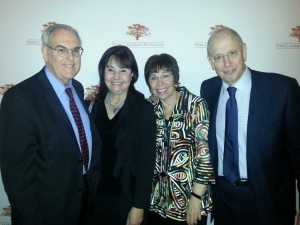Harnessing Grief by Restoring Hope and Rebuilding Lives
 The heartbreaking images from the South Korean ferry tragedy have fueled outrage and sorrow around the globe. The ferry sank on April 16 and 210 persons have thus far been confirmed dead; 92 are still missing. Scores of the dead were among 325 high school students who were on a field trip. This week, President Park Geun-hye apologized to the nation over the government’s inadequate first response to the ferry tragedy.
The heartbreaking images from the South Korean ferry tragedy have fueled outrage and sorrow around the globe. The ferry sank on April 16 and 210 persons have thus far been confirmed dead; 92 are still missing. Scores of the dead were among 325 high school students who were on a field trip. This week, President Park Geun-hye apologized to the nation over the government’s inadequate first response to the ferry tragedy.
“I am losing sleep as there is no news about saving more lives and because there are many families who don’t know whether their loved ones are dead or alive still,” Park said. “I am sorry, and my heart is heavy that so many precious lives are lost because of the accident.”
Park also attended a memorial in Ansan, the Seoul suburb where many of the students who were on board the ship lived.
One father expressed the feelings of many of the parents: “All we are asking for is, ‘Bring the dead bodies out,’” he wailed. “We know they are not alive now.”
How does a parent ever move beyond such sudden, shocking, debilitating and pervasive grief? Liz and Steve Alderman, whose 25-year-old son, Peter, was murdered on 9/11 at The World Trade Center, transformed their grief into meaningful action and a living memorial to their son.
On Monday evening, we were pleased to join 200 people gathered at the Pierre Hotel for the annual benefit for the Peter C. Alderman Foundation. The foundation trains doctors and establishes mental health clinics on four continents to treat victims of PTSD. It has proven so effective, that President Barack Obama honored the Aldermans for their work.
Erica Hill of the Today Show, a friend of the Aldermans, who served as MC, said she had an instant connection with the Aldermans when she first met them.
“I am inspired by the way they turned a tragedy into something no parent should ever have to experience into another way to help 100,000 people,” she said.
Liz Alderman conceived of the idea of PCAF while watching a television broadcast about the victims of torture terrorism.
“We knew we had to create our own memorial for Peter,” Liz Alderman told us in an interview for our book, The Living Memories Project: Legacies That Last. “We really didn’t know what to do. And then we saw a Nightline broadcast that said one billion people in this world—one-sixth of humanity—have directly experienced torture terrorism and, of those who have survived, over 50 percent suffer debilitating traumatic depression and posttraumatic stress disorder. They can’t work, children can’t go to school, and some people can’t even leave their beds.”
Since it was established 11 years ago, the foundation-trained staff has helped 100,000 people. PCAF sees hundreds of patients daily – including child soldiers – at its clinics and community outreaches in Uganda, Cambodia, and Kenya. It works in IDP and refugee camps, hospitals and schools. It trains indigenous doctors and health workers to recognize and treat the mental health and psychosocial needs of their countrymen. PCAF also partners with governments to establish clinics and provide care for traumatized populations. As such, it works to support post-conflict societies in rebuilding people’s lives and restoring hope.
At the dinner, the organization honored Ishmael Beah, the bestselling author of A Long Way Gone, Memoirs of a Boy Soldier with its Humanitarian Award. In addition, Dr. James Okello, a director of the PCAF Psychotrauma Clinic, and Chief of the foundation’s Child and Adolescent Division, received the Sarlo Foundation Leadership Award for rendering outstanding service to war-traumatized patients.
“The main reason for starting this is that we wanted to leave a mark that Peter existed on this earth,” Liz Alderman said in the book. “He died at a very young age. We believe that we have left a profound and indelible mark that Peter existed; the world is a better place because he lived. Peter loved life and if we can return people to life so that they can live their lives, that is the perfect way to memorialize him.”
The Living Memories Project: Legacies That Last is now available on Amazon, including eight reader reviews:
Peter C. Alderman Foundation: http://www.petercaldermanfoundation.org/



